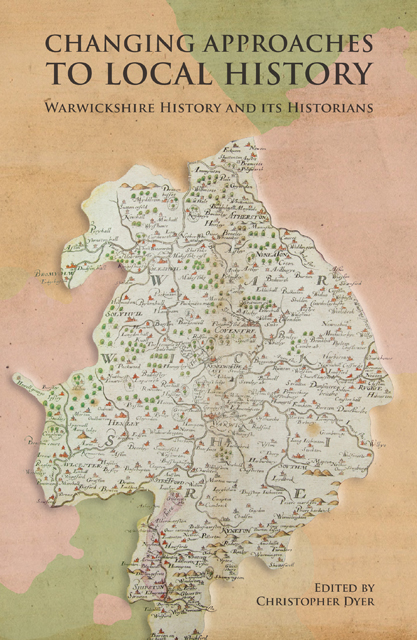Book contents
- Frontmatter
- Contents
- List of Illustrations
- Notes on Contributors
- Foreword
- Acknowledgements
- List of Abbreviations
- Introduction
- 1 The Dugdale Society: Its First Hundred Years
- 2 The Beginnings of Coventry
- 3 Was Commerce in Late Medieval Coventry Restricted by Regulation?
- 4 Studying Late Medieval Small Towns in Warwickshire 1920–2020
- 5 Rural Warwickshire in the Middle Ages: Society and Landscape
- 6 Religion, Rebellion and Red Jackets: Changing Approaches to Society and Politics in Sixteenth-century Warwickshire
- 7 Social Networks, Intellectual Affinities and Communal Harmony in Post-Reformation Warwickshire
- 8 Discovering Warwickshire’s Vernacular Architecture
- 9 Local History and the English Civil War: A View from Warwickshire
- 10 Writing Histories of the Landed Elite in Georgian Warwickshire
- 11 The Victoria County History in Warwickshire
- 12 Writing Women into the Political History of Warwickshire
- 13 Shakespeare and the Warwickshire Landscape in the Age of the Tourist
- Conclusion
- Index
4 - Studying Late Medieval Small Towns in Warwickshire 1920–2020
Published online by Cambridge University Press: 17 December 2022
- Frontmatter
- Contents
- List of Illustrations
- Notes on Contributors
- Foreword
- Acknowledgements
- List of Abbreviations
- Introduction
- 1 The Dugdale Society: Its First Hundred Years
- 2 The Beginnings of Coventry
- 3 Was Commerce in Late Medieval Coventry Restricted by Regulation?
- 4 Studying Late Medieval Small Towns in Warwickshire 1920–2020
- 5 Rural Warwickshire in the Middle Ages: Society and Landscape
- 6 Religion, Rebellion and Red Jackets: Changing Approaches to Society and Politics in Sixteenth-century Warwickshire
- 7 Social Networks, Intellectual Affinities and Communal Harmony in Post-Reformation Warwickshire
- 8 Discovering Warwickshire’s Vernacular Architecture
- 9 Local History and the English Civil War: A View from Warwickshire
- 10 Writing Histories of the Landed Elite in Georgian Warwickshire
- 11 The Victoria County History in Warwickshire
- 12 Writing Women into the Political History of Warwickshire
- 13 Shakespeare and the Warwickshire Landscape in the Age of the Tourist
- Conclusion
- Index
Summary
Over the last three decades there has been a growing appreciation among historians of the importance of small market towns in the local, regional and national economies of late medieval England. Between 1270 and 1540 some 600 small towns existed in the kingdom, on average one for every 8,000 people, and Warwickshire was among those counties enjoying the highest density of them. By the 1377 poll tax, 23 per cent of the county’s population lived in towns and by 1524–25 this had risen to 28 per cent. This trend was to continue, and it is thought that towards the end of the seventeenth century around a third of all the people in Warwickshire were town dwellers. The study of late medieval small towns has been transformed since the Dugdale Society came into existence in 1920, both in historians’ lines of inquiry and also in the sources used to seek answers to questions about their development and characteristics. A hundred years ago the approach was essentially to explore all towns, whether large or small, from legal and institutional standpoints. It was extremely rare for smaller towns to be studied at all by academic researchers. Instead they became relegated to the preserve of antiquarian writers, as more serious academic historians tended to focus almost exclusively on well-established, larger urban places. The transformation of their study since 1920 was energised by a number of scholars whose work started to appear in the 1960s. There were broadly three strands of innovation shown by the work of documentary historians such as Carus-Wilson and Hilton; Beresford, who contributed through his work on planted towns and boroughs; and the topographers, exemplified by Slater, who started to explore the development of towns by careful analysis of their plans. All of these, approaching from different directions, contributed greatly to the evolution of their study, with all ultimately complementing each other.
Even in the early twenty-first century academic studies of individual small towns nationally are not plentiful, so Warwickshire is fortunate that many of those in the county have been researched using the techniques of modern scholarship developed since the 1960s. It is also noticeable that these studies have frequently been at the cutting edge of new methodologies.
- Type
- Chapter
- Information
- Publisher: Boydell & BrewerPrint publication year: 2022



